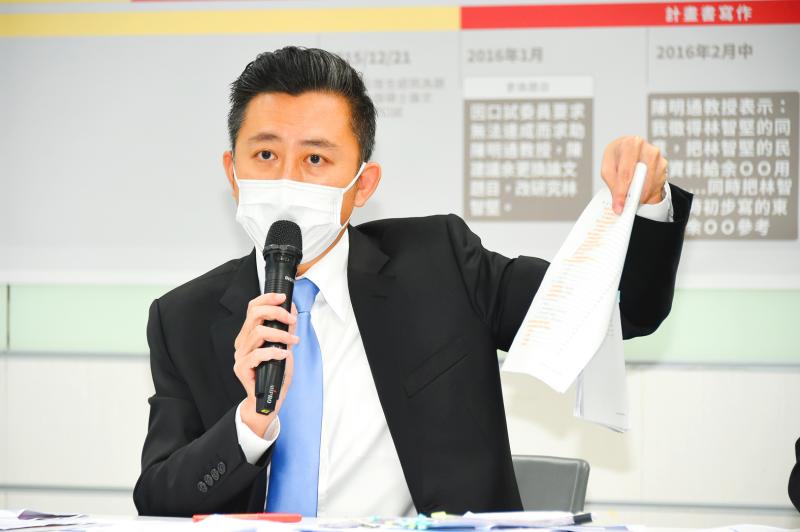The Democratic Progressive Party (DPP) Taoyuan mayoral candidate Lin Chih-chien (林智堅) yesterday denied allegations that he plagiarized his two theses at a news conference in Taipei, where he was accompanied by a lawyer.
The accusations against Lin, who obtained two master’s degrees, were first made on July 5 by Taipei City Councilor Wang Hung-wei (王鴻薇) of the Chinese Nationalist Party (KMT). Wang said that Lin’s master’s thesis from his studies at Chung Hua University plagiarized a report commissioned by the Hsinchu Science Park Administration.
Political commentator Huang Yang-ming (黃揚明) on the same day also said he had found “striking similarities” between the first two chapters of Lin’s 2017 master’s thesis, published at National Taiwan University’s (NTU) Graduate Institute of National Development, and the work of Yu Cheng-huang (余正煌), another student at the same institute whose thesis was published in 2016.

Photo: Tu Chien-jung, Taipei Times
Lin said yesterday that the accusations are unfounded, and he held the news conference to “protect my reputation and prove my innocence with evidence, as well as defend the innocent universities, teachers and students that are affected by the accusations.”
Lin said he did not respond at length earlier because he “wanted to let the evidence speak the truth,” and that preparing evidence from 14 years earlier took time to complete.
Lin said that he wrote the master’s thesis at NTU himself, including developing the topic and research method, and denied the plagiarism allegation.
He has asked an attorney to provide an attestation of the evidence, he added.
Correspondence from February 2016 between himself and then-NTU Institute of National Development professor Chen Ming-tong (陳明通) shows the discussion of his research plan, he said.
Chen provided Lin’s thesis outline to Yu for reference, with Lin’s approval, he said, adding that Yu had nearly finished his studies and had his thesis published first.
“I’m a kind material provider, Chen is a responsible adviser and Yu is a graduate student who worked hard to complete his study,” Lin said.
Regarding the Chung Hwa University thesis, Lin said he was a research assistant to his adviser, and together they presented a report at a conference, which became the basis of his thesis.
It is common in academia that students use state-sponsored projects of the advisers as a basis for a thesis, he said.
KMT Culture and Communications Committee deputy director Lin Chia-hsing (林家興) yesterday said in a statement that Lin’s clarification “raised more questions.”
The sequence diagram provided at the news conference showed that Lin Chih-chien and Yu wrote their proposals and theses at almost the same time, and he said he “referred to the conclusion in Yu’s thesis,” which indicates an element of plagiarism.
Lin Chih-chien also failed to address questions surrounding his research at Chung Hua University, such as how much of the thesis he wrote, he added.

Taiwan has received more than US$70 million in royalties as of the end of last year from developing the F-16V jet as countries worldwide purchase or upgrade to this popular model, government and military officials said on Saturday. Taiwan funded the development of the F-16V jet and ended up the sole investor as other countries withdrew from the program. Now the F-16V is increasingly popular and countries must pay Taiwan a percentage in royalties when they purchase new F-16V aircraft or upgrade older F-16 models. The next five years are expected to be the peak for these royalties, with Taiwan potentially earning

STAY IN YOUR LANE: As the US and Israel attack Iran, the ministry has warned China not to overstep by including Taiwanese citizens in its evacuation orders The Ministry of Foreign Affairs (MOFA) yesterday rebuked a statement by China’s embassy in Israel that it would evacuate Taiwanese holders of Chinese travel documents from Israel amid the latter’s escalating conflict with Iran. Tensions have risen across the Middle East in the wake of US and Israeli airstrikes on Iran beginning Saturday. China subsequently issued an evacuation notice for its citizens. In a news release, the Chinese embassy in Israel said holders of “Taiwan compatriot permits (台胞證)” issued to Taiwanese nationals by Chinese authorities for travel to China — could register for evacuation to Egypt. In Taipei, the ministry yesterday said Taiwan

Taiwan is awaiting official notification from the US regarding the status of the Agreement on Reciprocal Trade (ART) after the US Supreme Court ruled US President Donald Trump's global tariffs unconstitutional. Speaking to reporters before a legislative hearing today, Premier Cho Jung-tai (卓榮泰) said that Taiwan's negotiation team remains focused on ensuring that the bilateral trade deal remains intact despite the legal challenge to Trump's tariff policy. "The US has pledged to notify its trade partners once the subsequent administrative and legal processes are finalized, and that certainly includes Taiwan," Cho said when asked about opposition parties’ doubts that the ART was

If China chose to invade Taiwan tomorrow, it would only have to sever three undersea fiber-optic cable clusters to cause a data blackout, Jason Hsu (許毓仁), a senior fellow at the Hudson Institute and former Chinese Nationalist Party (KMT) legislator, told a US security panel yesterday. In a Taiwan contingency, cable disruption would be one of the earliest preinvasion actions and the signal that escalation had begun, he said, adding that Taiwan’s current cable repair capabilities are insufficient. The US-China Economic and Security Review Commission (USCC) yesterday held a hearing on US-China Competition Under the Sea, with Hsu speaking on